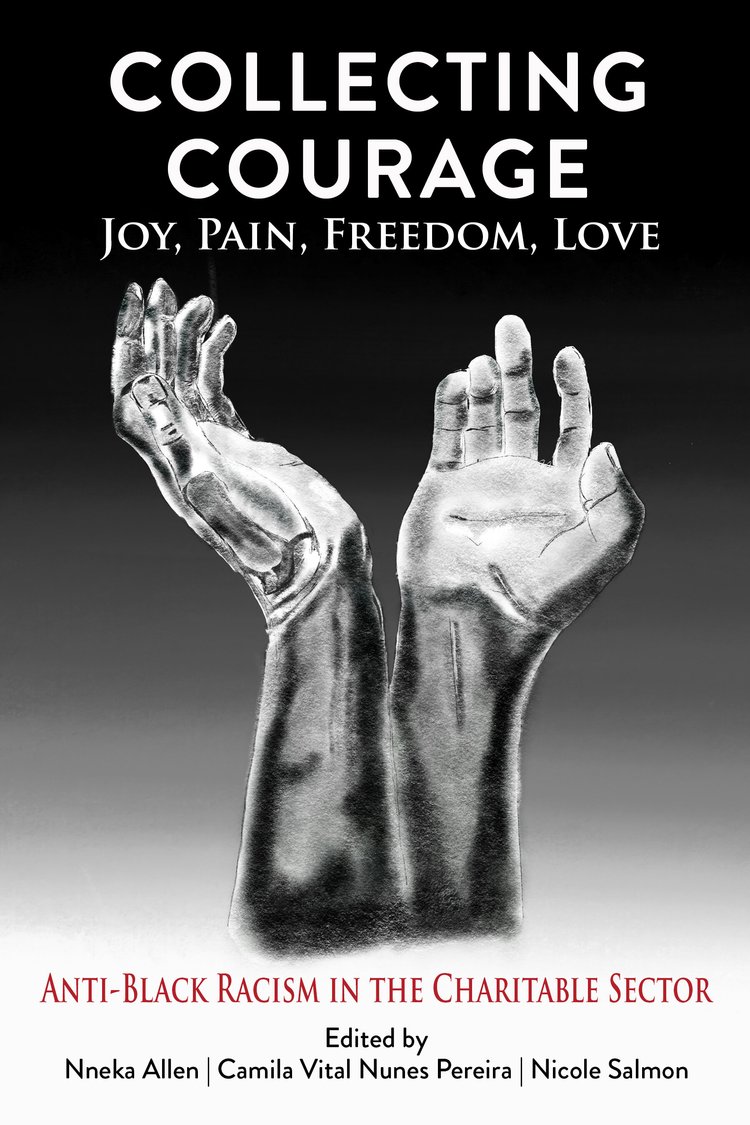
Since the tragic death of George Floyd by police last summer and the protests that followed, nonprofits across the country have released statements, expressing solidarity and even proclaiming Black Lives Matter. But many activists and people in the field have rightly criticized organizations for paying mere lip service without actually taking meaningful actions to promote equity, diversity and inclusion within and without their organizations.
Collecting Courage: Joy, Pain, Freedom, Love, edited by Nneka Allen, Camila Vital Nunes Pereira, and Nicole Salmon, shows that fundraising, like the rest of society, has its own problems with racism and discrimination. Allen writes in the introduction: “Benevolence, far from fully earned, is conferred gratis on the charitable sector…the real identity and behavior of the charitable sector must be subjected to the light of truth.”
The book presents the perspectives of 14 Black fundraisers from across the US and Canada and how they’ve experienced and dealt with discrimination from within the field. Allen explains, “This is a collection of voices that have been systematically ignored and erased from a sector meant to promote the love of people.” These are stories of resilience, pain, and joy as fundraisers tell their stories of working in fundraising offices.
Who Should Read This Book?
Everyone in fundraising would benefit from this book. It’s a critical read for people in fundraising at all levels to see how structural racism impacts the work environment of fundraisers of color. People in leadership positions can see how managerial decisions contribute to discrimination. For instance, Niambi Martin-John, Director of Development of Stephen Lewis Foundation, recalls when she was asked to “tone down her smarts” by a senior leader at her former organization.
Fundraising peers can learn how they contribute to this hostile environment, whether it’s through microaggressions, passive aggression, or ignorance towards their fellow fundraisers.
It’s a valuable read for People of Color in the field since it validates their experiences of racism. The microaggressions or outright discrimination aren’t one-off experiences, nor are they imagining these incidents. The book provides some thoughts and guidance on how Black fundraisers pushed back or recalibrated.
Ultimately, the book serves two purposes – (1) it’s a documentation of the Black Fundraisers experiences, and (2) it’s a first step to figuring out how fundraising can start the process of making workplaces more inclusive and equitable. But reading a book isn’t going to change the industry.
Where Does It Take you?
The book is organized around the themes of joy, pain, freedom, and love. The first section explores three women’s experiences reflecting on the role that joy plays in their lives and fundraising work.
The section on pain explores the harm that four fundraisers experienced in the field. In story after story, they relate how they internalized White expectations of behavior and diminished their true selves at the cost of their physical and mental health. Then they would leave their roles after receiving no support or pushback from their bosses and leadership.
For example, Kishshana Palmer, founder of Kishshana & Co, explains how she would never announce a new role until she stayed past eight or nine months. What a terrible price to both the fundraiser as well as the nonprofit with this incredible loss of talent and turnover disruptions!
The next section “Freedom” explored how fundraisers found spaces to push back against the discrimination they faced and/or found their own sense of self. Martin-John describes strategies she’s learned to use like saying “no” and taking credit for her good work.
The final section is Love where four fundraisers explore their love for the field, humanity, and themselves.
Is It Worth the Purchase Price?
At $29.99, this book is well worth the price. It’s the start of a deeper dive that philanthropy needs to take to see how white supremacy is intertwined with the profession. The book provides a digestible summary with how US and Canadian history has led to the inequality in distribution of wealth as well as structures of power.
Naimah Bilal, Chief Development Officer of Children’s Literacy Initiative, uses the apt metaphor for the book of a fugue, “a contrapuntal composition in which a short melody or phrase is introduced by one part and successively taken up by others and developed by interweaving the parts,” for the book as a whole. She explains in the essay, “In many ways, when set next to those you will read in anthology, my own narrative may feel like a variation on a theme. You, the reader, will recognize patterns of inequity and pick out rhythms of discrimination without redress.”
Each of the fundraisers talk about their own challenges within the field, how they feel limited by the structures of White supremacy, either by having to conform to White expectations of behavior, dress, and more, being thought less capable, than their White colleagues, or expendable when staff cuts were made. It’s a chilling look at how the industry, that aspires to make the world better, has failed its Black fundraisers over and over.
It also explores the contradiction inherent with the state of philanthropy. Fatou Jammeh, Institutional Donors, Reporting and Information Manager, World Food Programme, noted about a specific experience she faced at a fundraising job: “The organization was supposed to be committed to fighting for the rights of people who lack a platform from which to speak out. Ironically, there I was speaking up and being shut down.” While it is her experience with one nonprofit, it is not a unique occurrence in the fundraising world.
It’s a long-overdue analysis of the industry, and hopefully will not be the last. More importantly, it should be the opening of real discussions and work to change the system, just as nonprofits want to change the world.